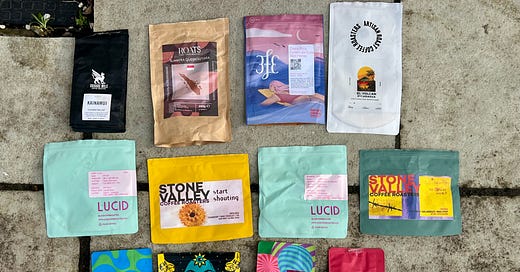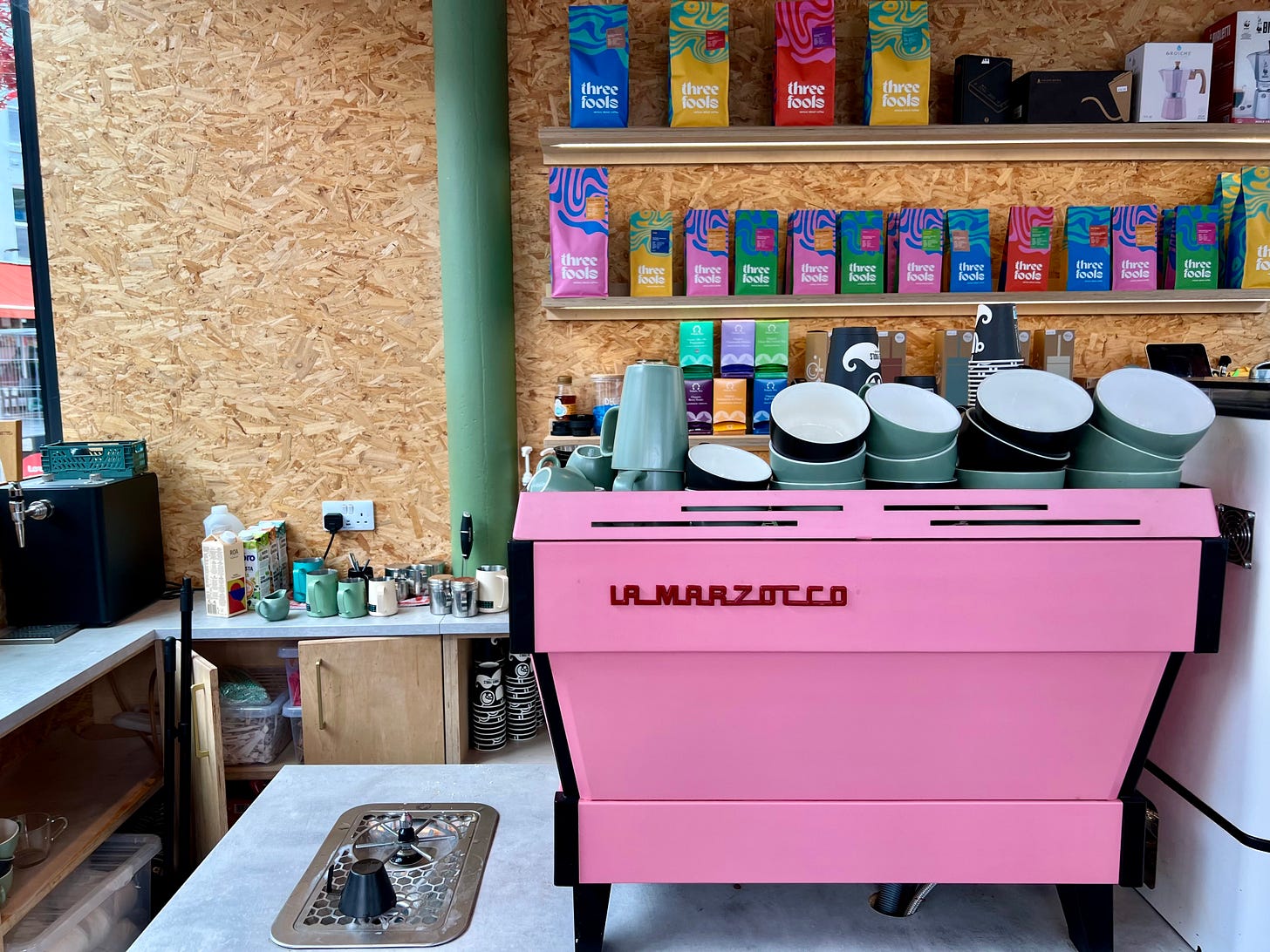On nine months of specialty coffee on the road, overseas
Notes on the reality of pursuing very good or even excellent coffee once you leave your familiar cafes, shops, roasters, and home gear behind

There’s no place like home.
One of the more complicated short sentences in the English language.
There are Gatsby-adjacent realms this phrase invokes, discussing nostalgia time travel aspirations clutched in an “if only, those golden days” types of home. There’s delving into ever-complicating family dynamics, recently handled well on the Art of Manliness. Here, I mean home in the things we know.
Against all odds I’ll make another Wizard of Oz reference in as many essay. Diana Ross’s “Home” in The Wiz speaks to this specific comfort, a chest softening, surrounded by familiar landscapes, trees that know your name. “I wish I was home,” she sings, “I wish I was back there with the things I've been knowing.”
This, for me, applies to coffee. At some point during the pandemic my coffee rituals and I became closer than close.
Here’s how it’d go: I get up. I write, read the news and listen to the radio, and work. Two hours later — and I was doing this way before huckster Andrew Huberman recommended it, thank you — I make my first coffee.
That’d be a pour over with Fellow gear: Stagg Pour-over Dripper and a paint-flecked pour-over kettle. I didn’t keep purified water on deck, and I didn’t plunge a thermometer into the boiling water. My grinder was that ubiquitous, black crappy one from Safeway or wherever. I don’t even own a scale! Swoon, maybe someday I’ll carry that much cash.
Since I don’t and didn’t, I had roommates. Some days I’d make us a large French press, dole out the goods in four mugs for a day’s worth of boost. On a very good day, I’d get a midday Super Smash Bros. break with said roommates over that second cup, a walk through Golden Gate Park to stroll the concourse. Creature comforts.
For the last few years my routines rarely varied. The coffee I kept in the kitchen hovered around $13 per pound, often from San Francisco or Northern California roasters. I’d judge coffee for the Good Food Awards once a year (brag!) and get samples sent through Standart, by pals. I’d go out for coffee. I’m not a caveman! I’d extend beyond my house in concentric circles: Yo Tambien Cantina, whatever was posted up on Ninth Avenue’s rotating circus (the best being Open Book Project and Poorboy), the Coffee Movement, Not Latte for slaggy, semi-sweet durian lattes.
Then I left my house of more than six years.
Like Ross’s journey into the brutalism of Richard Pryor’s Oz, this was a revelatory, even pined after journey. That doesn’t mean it wasn’t bittersweet; As we walked the empty halls of the house, my wife and I cried at leaving behind all those precious memories, the little routines.
Through the summer I stayed at my mother-in-law’s in Half Moon Bay, my mom’s place in Ellensburg, crashed on couches on the East Coast. By August I was in Ireland. Then Scotland, then Croatia, then Italy, then Slovenia, then England, then Germany. I didn’t have my little coffee routine: far from it! Like Heinlein’s hero, a stranger in not just one strange land but many. I’m so neurotic that just getting up at a different time of morning is a strange land by my usual standards. You can imagine my surprise in Berlin’s infamous nightclubs at 3 in the morning.
Much of my coffee experience is not novel. It’s been covered by magazines and influencers and movies. I’m optimistic nothing here is offensive in my speaking on how I’ve navigated this chapter. But as I prepare to return to the West Coast, there’s a time capsule aspect to how I’ve experienced coffee outside the Bay Area bubble.
People don’t care if you like nice coffee
California may be a place where it’s appropriate, even chic, to be snobby. I reference often that this is what James Beard himself — a Pacific Northwest homegrown gourmand — noted of the Golden State. On my travels I found that, most of the time, it’s not appropriate or important to center my love of good coffee. Eating breakfast at a homey hotel in rural Gospić isn’t the time to spend 20 minutes on Google seeking out a shop with direct-purchased beans.
I am lucky to have friends and family who put up with me, even let me pencil a visit to a roaster on the day’s itinerary. Staying at someone else’s house is not a great time to exhaust their generosity by displacing their appliances for your carefully packed gooseneck kettle. I might cringe to see rows of beans kept in the freezer like soup dumplings. But coffee falls into the same camp as wine afficionados and Wagyu beef enthusiasts: keep that weird shit at home unless we ask, thanks.
Specialty coffee culture is, yes, global
Maybe one of the worst parts of coffee communities anywhere, emphasis on the fact that this happens over and over in lots of nooks and crannies urban and rural, is the penchant to say to themselves: “if only people knew how good we are at coffee, in fact how good at coffee I am.”
I know coffee professionals around the world. Gratefully, many are humble, cool people. A lot of them, though, do suck: they really do think they know best, that they have better coffee ideas than everyone else. I’ve encountered them in the writing world, alongside me pulling espresso, bumping into me at the grocery store. The West Coast keeps this powerful, lame energy in spades.
As far as I can tell, we’re really wrong about that presumption. Just in Ireland — scattered through the backwaters and the promenades of Dublin, Galway, Cork, and Cobh — I found shops with baristas as talented as anywhere I’ve been. Londoners with their James Hoffman acolytes scoff at the West Coast. That’s not to mention in producing countries, rich in fourth wave booms of domestically grown wonders; Poet and bon vivant Alan Chazaro just penned for Mexico News Daily all about Veracruz’s uproarious cafe culture.
Time to expand the lens, coffee people; It’s not just Japan that’s worth putting on that ever-so problematic, Jiro Dreams of Sushi pedestal.
Specialty coffee culture is not that global
On the exact same coin, there are differences that can be frustrating. In the early summer while I was in rural Washington, I found that I couldn’t get good coffee if I sawed off my arm and fed it to wild baristas. Still, I could get a 16 ounce coffee to assist in my disassociating at family events. I take my wins where I get them!
Filter coffee is a privilege abroad, for instance.
I was stoked when shops understood what I meant when I rocked up for the black stuff. Espresso being one of Europe’s big claims to fame combined with the fact that they don’t have to work like dogs sustained by bean juice like us Americanos means big simmering tanks of coffee are less popular. I tried to order a pourover at what I was led to believe was a fancy shop in Cork, and got a blank stare until one of the workers piped up that he could make one. I couldn’t even grind the beans I bought at aesthetically pleasing shops! Horrifying stuff.
I tried to staunch my internal bleeding. I bought Onyx Coffee’s advent calendar, a Peanuts-themed 24-day affair of instant coffee merriment. I regret the purchase! It came weeks late, I tried desperately to shoehorn it into my writing, and it cost some $150. I wish I had just leaned in to what I had going for me here: espresso out the wazoo, Barry’s Tea.
I’m glad I was never that precious with my routine
Whether because of I-5 driving with my stupid cat screaming his head off for the third hour in a row or sleeping in the rental car outside Croatia’s Krka National Park, I’m thankful my set-up never got too comfortable. In my San Francisco kitchen I kept my experience in perspective: getting too hooked on my routine, my gear, my natural-processed Costa Rican Caturra beans, could prevent me from living life.
At the end of the day, the great majority of life is not lived two hours after waking up, letting the water cool so as not to burn the coffee before preparation. It’s lived outdoors, hiking the Julian Alps with a friend, yelling at the car rental company at the Llubljana airport, chugging whatever legal stimulant gets me from A to that mystical B.
It’s good to remember routine often creeps up to shoulder real life, lived in your body, to the side. It’s insulating by design.
In 2021 I spent a month with the Ts’umbal Xitalha’ cooperative in Chiapas, Mexico — “at origin” as coffee people call it — and showered in freezing water after huge dinners of rice and beans. In The Book of Five Rings, Miyamoto Musashi warns his apprentice one should never go in search of good food or drink. I unfortunately do that all the time. It is a good reminder, though, to never be too precious about the whole thing. Like Bilbo, I’m trying to lean into discomfort, then go home to chew that pipe, cold water and all.
I’m thankful I’ll be back, despite the damning political movements of my countryfolk. I am looking forward to cups of coffee, made at home or ordered out, and lattes with chunks of avocado swimming in oat milk. Like a David Sedaris-ass ending bow-tying this whole thing up, I know I wouldn’t be appreciating how nice it all can be on the Best Coast without this new vantage.
“Living here, in this brand-new world, might be a fantasy,” Ross swells. “But it taught me to love, so it's real, real to me.”






You're always welcome down in LA where I'll brew you (almost) whatever you want. Avocado oat lattes included <3.